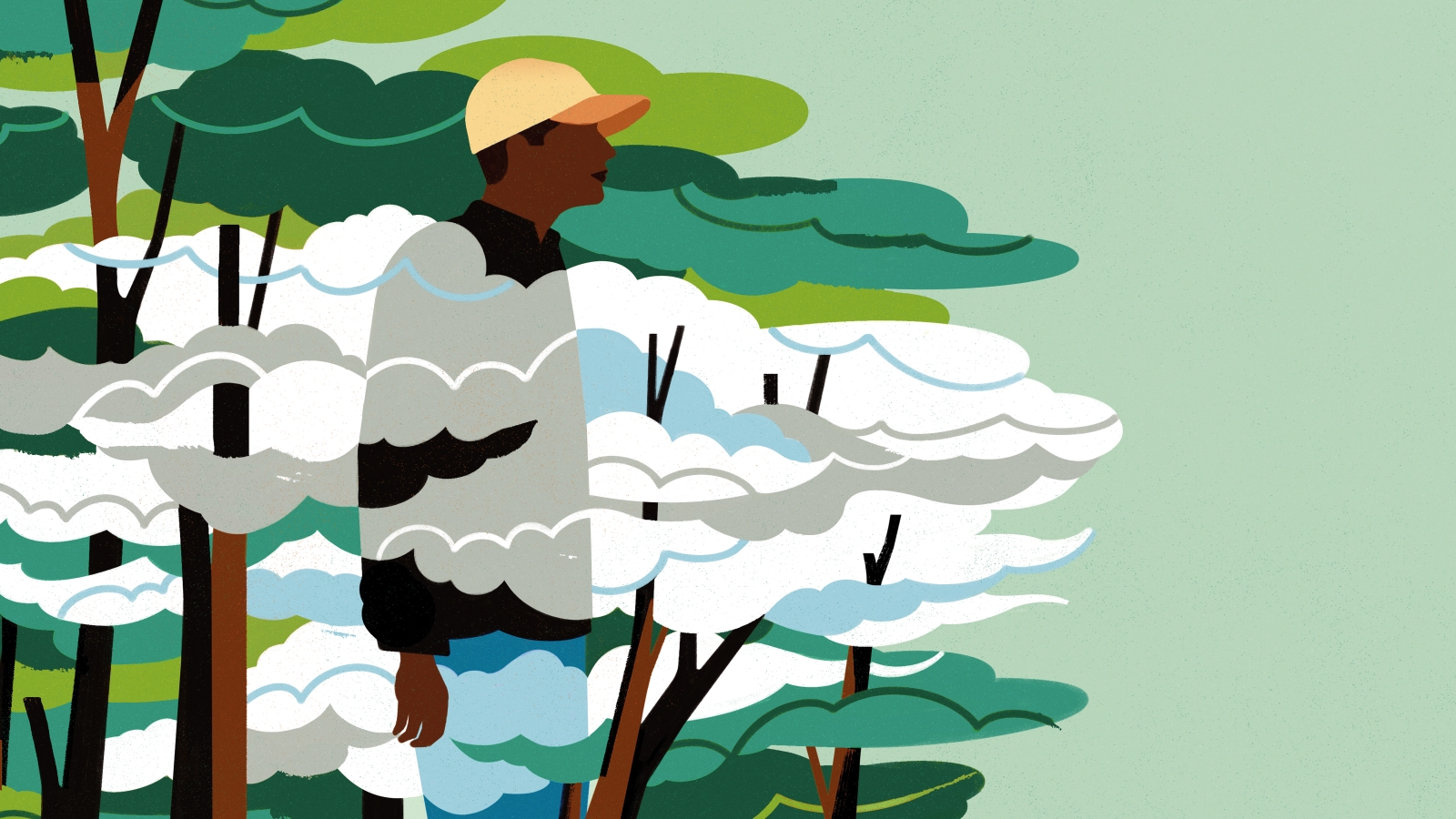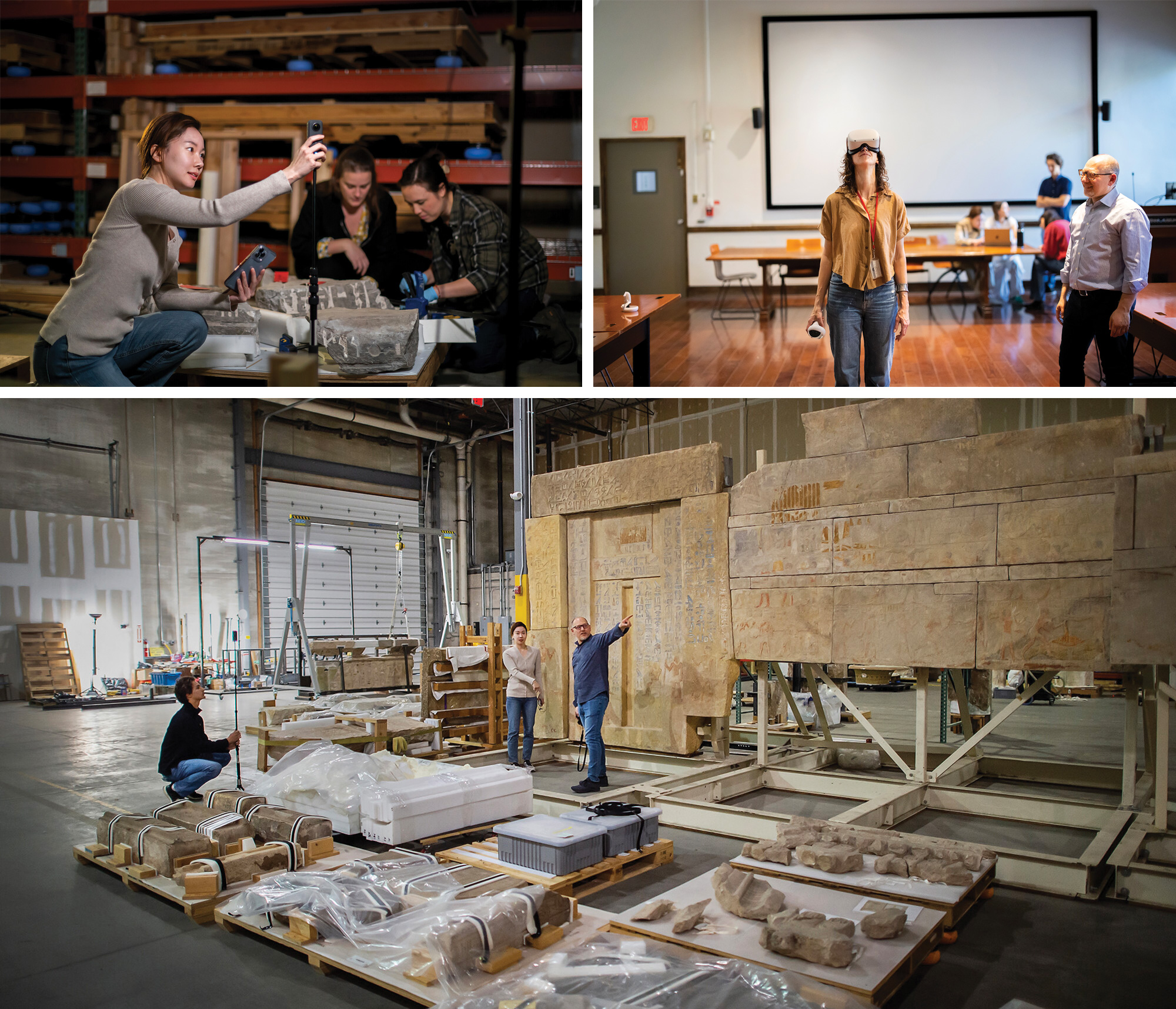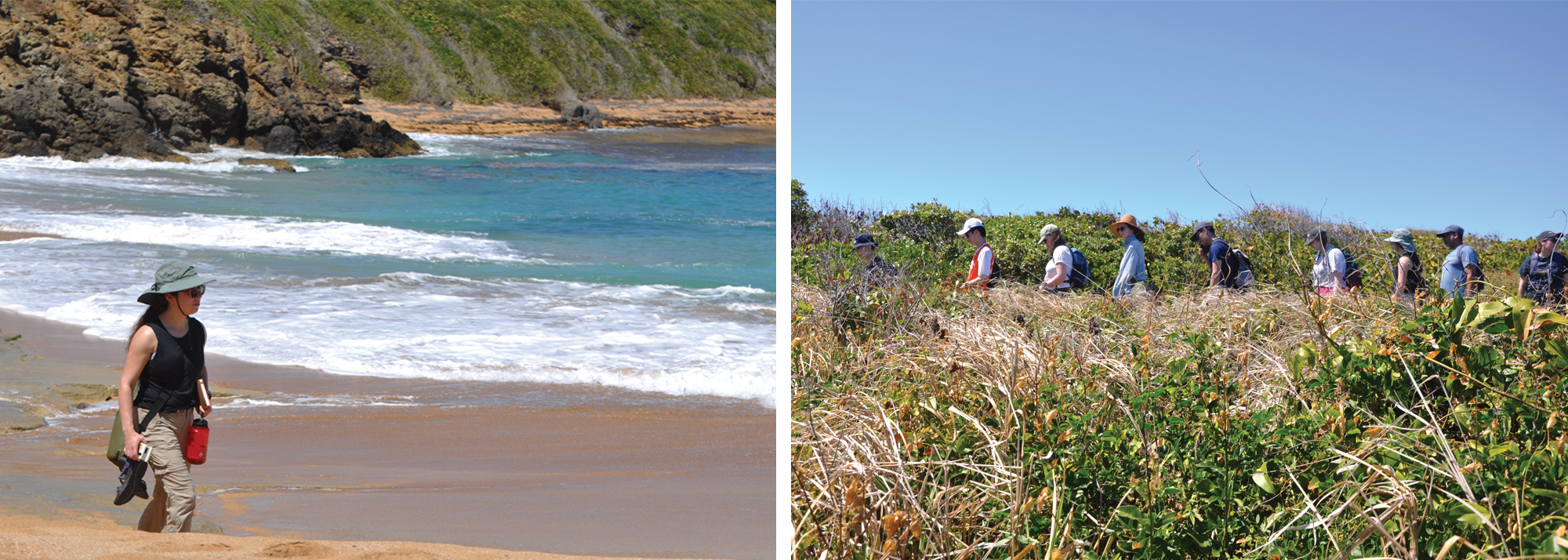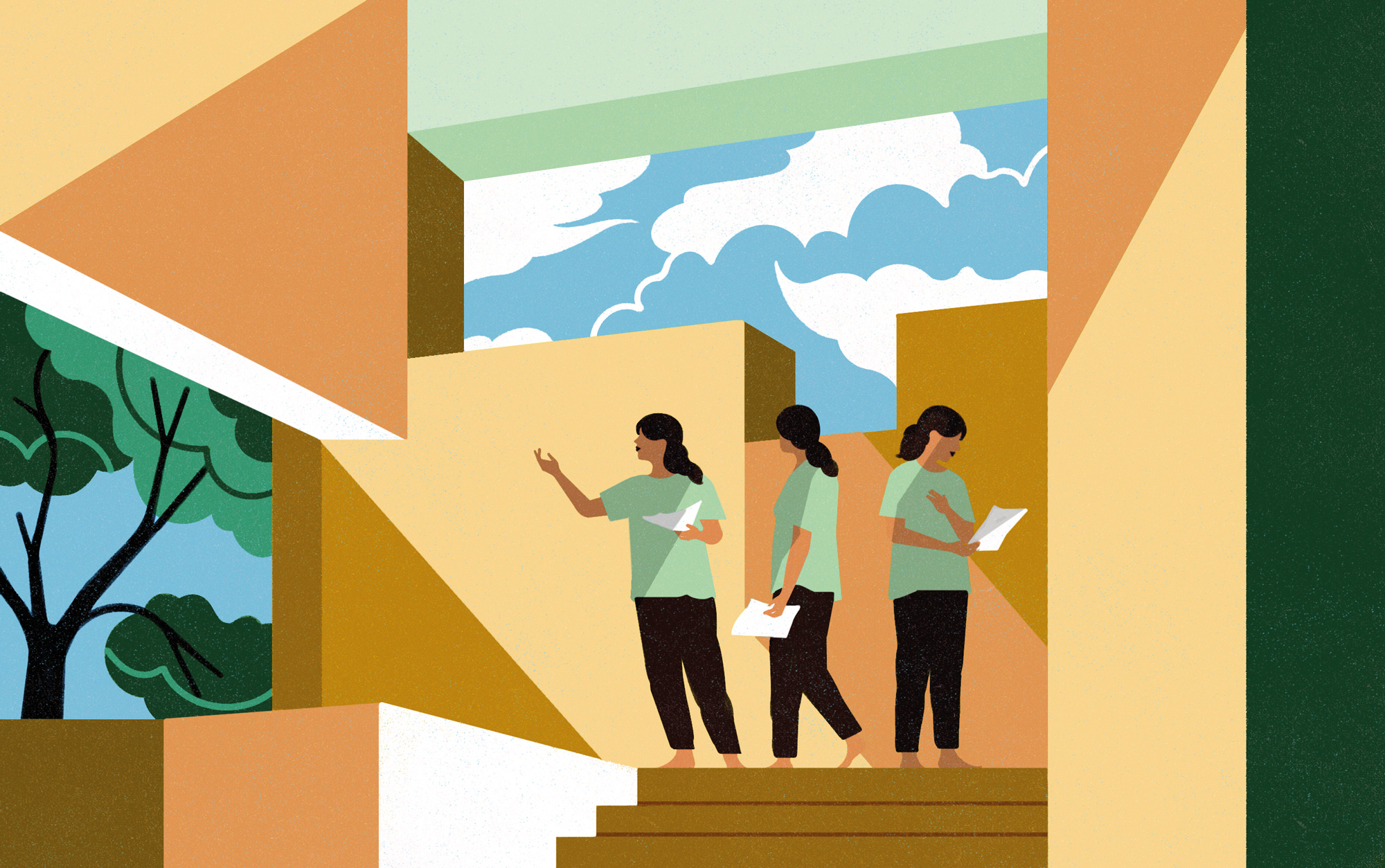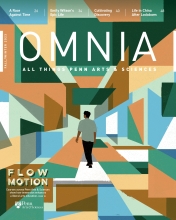Last fall, Joe Anderson, C’23, tried something new: He eliminated music from his daily run. Without that distraction, he focused solely on his movements—his lungs filling with each breath, the rhythm of his sneakers hitting the pavement—and soon, he found his fatigue dissipating, miles passing more easily, and time falling away.
There’s a word for what Anderson experienced: flow.
Introduced in the 1970s by Hungarian psychologist Mihaly Csikszentmihalyi and recognized for its effects on personal wellbeing by Martin Seligman, Zellerbach Family Professor of Psychology and director of Penn’s Positive Psychology Center, flow is often referred to as “being in the zone.” It occurs when an activity so completely absorbs someone that common concerns like time, hunger, self-consciousness, and surrounding sounds and motions get shelved.
Anderson, who majored in political science and history, didn’t ditch his running soundtrack by choice. Eschewing electronics was required during a monthlong commitment to ascetic practice as part of the course Living Deliberately: Monks, Saints, and the Contemplative Life, taught by Justin McDaniel, Professor of Religious Studies and Edmund J. and Louise W. Kahn Endowed Professor of the Humanities. Like McDaniel, Penn Arts & Sciences faculty spanning a range of disciplines, from cinema & media studies to environmental studies and theatre arts, have designed courses that engage students in experiences outside the classroom, offering something different than what lectures and discussions alone can accomplish.
Research has shown that “immersive learning”—instruction involving intensive exposure to highly specific surroundings, topics, or conditions—benefits scholars in all subjects, providing greater fulfillment and enhancing their capacity to process and retain information. This is also a fundamental part of a liberal arts education, which seeks to challenge students’ preconceptions, improve their communication and problem-solving, and cultivate their adaptability and sense of social responsibility. Unconventional learning opportunities in diverse, “real-world” settings are crucial for developing these skills, McDaniel says.
Opportunities like adhering to basic tenets of monastic life for a month. “Across the board, my students get better grades, lower their anxiety, and connect more deeply to themselves and others,” McDaniel says, noting that Positive Psychology Center researchers have formally measured these improvements. “This wouldn’t happen without the immersive aspect of the course, without students making fundamental changes in their day-to-day lives.”
The Sound of Tires
McDaniel, who has offered Living Deliberately at Penn approximately every third semester since 2010, conceptualized the class when he was teaching at Ohio University more than two decades ago. Students frequently asked him why followers of so many religions would self-impose restrictions on pleasures like eating, socializing, and sex, and he struggled to explain the draw of deprivation.

“I could give psychological reasons, economic reasons, and sociological reasons, but those never fully captured why every religion on Earth, for as long as human history has been recorded, has promoted some form of ascetic practice, whether it be fasting or celibacy or the way they dress,” he says.
So, he devised a set of restrictions for students to try—and as the experiment proved successful, he gradually expanded the list to what it includes today. For one month, both inside and outside of the classroom, his students are not permitted to speak, gesture, make eye contact, touch other people, wear makeup or colorful clothing, spend more than $80 per week, or eat processed or seasoned foods. They must be up by 5 a.m., log a journal entry every half-hour, meditate, and perform at least one act of kindness each day.
Perhaps the toughest rule of all, he says, is no technological devices. Computers count, meaning students have to handwrite all communication, including papers for other classes. And on day one of the vow of silence, McDaniel confiscates students’ cell phones, which remain in a lockbox until the end of the month.
“I’m not anti-technology. I have a smartphone and a car that’s full of computers. I teach a class online. I like TV and YouTube. It’s just that there’s a time and place for these tools, and what often happens is the tools control you, instead of you controlling the tools,” he says. “Giving them up shows you what you’re missing when faced with incessant distractions.”
In other words, McDaniel believes plunging his students into the monastic lifestyle teaches them to pay attention. And he has plenty of stories to back that up. His favorite, he says, involves a young woman who came to him in tears because her car was making an ominous thump-thump-thump noise, and she could not afford to visit a repair shop.
There is great value in approaching problems in the kind of hermetic space of a classroom. But it’s important to be immersed in the field as well, with all of the challenges and variables that come with that.
Ultimately, the student realized she was simply hearing the sound of her tires against the road. “She had never been in a car without the radio on, without conversation going on. And she said to me, ‘I’m in the car all the time. If I wasn’t aware of what my car naturally sounded like, what else am I missing every day?’” McDaniel recalls.
Anderson guesstimates that if Living Deliberately had relied exclusively on lectures and readings without the immersive component, he’d have gotten “maybe 12 percent of what I did out of it.” Since completing the course in December 2022, he still hasn’t introduced music back into his running routine, and he continues to pursue a slower-paced life, sitting “crisscross applesauce” during his routine meditation breaks.
“I loved this experience because it’s not what people associate with Penn, which I think is mostly seen as a pre-professional school that exists only to optimize your skills for graduation and employment,” Anderson says. “But this class is not for building your resume. It’s for becoming a better and happier person.”
Virtual and Actual Reality
While McDaniel immerses his students in quiet introspection, Peter Decherney—a professor in a very different discipline, cinema & media studies—plunks his directly into dynamic, collaborative environments.
An award-winning documentary filmmaker, Decherney, Edmund J. and Louise W. Kahn Endowed Term Professor in the Humanities, spent much of last academic year establishing an umbrella program that now houses several immersive education initiatives. Launched with support from Penn Global, Decherney’s Penn Global Documentary Institute puts students to work “in the real world” and also uses immersive media, or media that allows viewers to interact with content.
Over the past six years, Decherney has incorporated virtual reality (VR) filming into multiple programs. In Philadelphia, students in his Virtual Reality Lab course partner with a community organization whose work they document using 360-degree cameras, microphones, and editing software. Most recently, during spring 2023, they detailed the intricate transformation of the Penn Museum’s Ancient Egypt and Nubia galleries through VR films featuring conservators, curators, and a senior archivist.
“The excitement for students is experimenting with trial and error, trying techniques that might be mistakes with flat media but turn out to be really effective using immersive media,” Decherney says, explaining that VR technology allows filmmakers to create environments that users can explore freely for an embodied experience and higher emotional engagement. “They’re used to thinking in square frames, with certain limitations and a limited set of tools.”
They have to unlearn all of that, says Maya Pratt-Freedman, C’23, who took the course in her final semester before completing her bachelor’s degree in sociology and cinema & media studies. “It was about setting new conventions and discovering new ways of storytelling, checking things like if the camera is up high versus low, how does the viewer feel? How do they feel if I put the camera in the middle of a circle of people versus on the perimeter?” she says. “The class hit on all points of immersive learning. We got to learn new technology by actually using it while working with amazing experts on-site and seeing artifacts from this vast collection up close. And then the final product is itself a piece of immersive media that captures this entire phenomenal space, without boundaries.”
Pratt-Freedman had prior exposure to VR filming when she participated in another of Decherney’s field-based experiences: a summer abroad course held in a refugee camp in Kenya. Since 2017, with backing from the Penn Arts & Sciences Making a Difference in Global Communities grant program and the SNF Paideia Program, Decherney has taken students to Kenya three times in a partnership with FilmAid Kenya, a nonprofit that trains refugees in filmmaking and other media skills. In 2022, Pratt-Freedman and other Penn students partnered with the organization to turn its training program into a massive open online course.
At first, Pratt-Freedman remembers, FilmAid students and Penn students struggled to navigate cultural differences and find common ground. Then, when she grabbed a soccer ball and started juggling it, a group formed around her, and everyone worked together to keep the ball in the air.
“That moment showed us we could collaborate effectively,” Pratt-Freedman says. “We realized, if you take one person out, this whole game will fall apart, just like our projects would if we didn’t have all hands on deck. It was a moment that opened a door you couldn’t have opened sitting in a classroom.”
Of course, classroom meetings provide important opportunities to read, speculate, and exchange ideas, Decherney says, but the activities he facilitates are essential in a different way. “There is great value in approaching problems in the kind of hermetic space of a classroom,” he says. “But it’s important to be immersed in the field as well, with all of the challenges and variables that come with that, and to engage community and global partners. The stakes are raised when someone depends on you.”
A Walk Through the Clouds
Sometimes, a fieldwork experience influences someone so profoundly that the student goes on to make sure the opportunity endures for others. That’s what happened with a Penn course involving ecological field study in Puerto Rico.
As a doctoral student in geology, Sally Willig, Gr’88, participated in field trips to Puerto Rico led by Professor of Earth and Environmental Science Arthur Johnson—and promptly fell in love with everything about the island territory. When Johnson, who taught Field Study of Puerto Rico’s Soil for many years, retired in 2014, Willig, now a lecturer in Penn’s Master of Environmental Studies Program, took over and created Field Study of Puerto Rico’s Ecology.
Offered every other spring, the course begins with in-depth classroom study of Puerto Rico’s ecosystems and ends with students presenting a comprehensive research project. During spring break, they spend a week exploring the varied ecosystems in Puerto Rico in person. A highlight of the trip, Willig says, is hiking through El Yunque National Forest, the only tropical rainforest—as well as one of the most biologically diverse regions—in the U.S. National Forest System.
Progressing through El Yunque, elevation and landscape change significantly. “You move through four different forest types, and my very favorite is at the top, the elfin cloud forest. These dwarf trees are literally in the clouds. You’re up there walking through clouds, and everything is always wet and covered in green and you see so many beautiful plants and hear so many birds and frogs calling,” Willig says. “It’s a full sensory experience you cannot get anywhere else.”
Field Study of Puerto Rico’s Ecology was one of many field-based courses Alison Fetterman, G’16, a bird conservation specialist at Willistown Conservation Trust in Newtown Square, Pa., took while pursuing her master’s degree in environmental studies at Penn. She, too, became enamored of the territory’s rich biodiversity; after graduating, she returned to Penn to co-teach the course with Willig, which she continues to do today.
Discussion and analysis can only take you so far; you need to feel theatre in your body to process it. And unless you’re part of bringing a piece to life, you’ll never fully understand it.
An avid ornithologist, Fetterman calls her first visit to the rainforest “life changing,” as she encountered so many endemic birds she’d previously seen and heard only in pictures and on film. “The Puerto Rican lizard cuckoo, the Puerto Rican oriole—they’re amazing,” she says. “The Puerto Rican tody is one you can find easily there, but I could still talk all day about how exciting it is to see them.”
Last spring, Fetterman recalls, Penn students were walking single file through the Guajataca State Forest when a Puerto Rican tody called out with its signature nasal voice. Everyone got quiet, and the tiny, round, bright green bird flew right up to the group.
“It was doing its little meep sound as it traveled down the whole line, one by one, about two feet away from us,” she says. “I watched it make an impression on each student in real time—it felt like a setup, like this was our planned guest tody for the lesson. You just can’t get that kind of impact from a book.”
Because Willig and Fetterman have been visiting Puerto Rico together since 2015, they’ve established connections with many local environmental professionals. Nowadays, they’re familiar with enough resident experts that at every itinerary stop, students get to meet and learn from one.
“To hear from people who live there, who do this work all day as their life and their passion, it’s invaluable,” Fetterman says. “That kind of energy is contagious. The people we have built relationships with down there are just as important as the wildlife and plants we see. Being in the field just gives students the whole package.”
Creatively Critical, Critically Creative
Of all disciplines, theatre arts may seem among the best suited for an immersive experience; after all, preparing for a performance often means getting lost in playing the role of someone else.
In reality, says Jennifer Thompson, a lecturer in theatre arts, many college-level theatre courses are either academic or creative, and few culminate in the performance of a full-length stage piece. Thompson has a doctorate in theatre and performance, a master of fine arts in acting, and a bachelor’s degree in history and theatre studies, yet she never took a course like the one she’s leading at Penn this fall.
“Often, my creative classes were fun and playful and spontaneous, and my more academic classes were about critical thinking,” she says. “I felt like there were two parts of my identity being used, whereas what I want is to bring those pieces together so students can immerse their whole selves in the work and be critically creative and creatively critical, and to think as artists about the way that theatre can shape and influence society.”
In the class Theatre Rehearsal and Performance, Thompson’s students are examining Twelfth Night, William Shakespeare’s celebrated romantic comedy about deception, gender confusion, mistaken identity, and unrequited love. They have simultaneously been rehearsing the play—auditions were held this past March, requiring those selected as actors and assistant directors, stage managers, dramaturgs, or designers to register for her course—and Thompson will direct them in a public performance that will take place the weekend before Thanksgiving.
Engaging with a single work for an entire semester has enabled students to bring together the knowledge and skills they gain in other courses, from theatre research and history to onstage presence, she says. Students began the course by posing a research question related to their involvement in the piece; someone playing a grieving character, for example, studied Elizabethan practices of mourning and assessed how those customs related to their own sense of self.
In our lives there’s this nonstop train of obligations and conversations and distractions. Immersion basically gives students permission to get off.
“We have them frame the question in such a way that it’s historical in scope, but it also ends up telling them something that informs their artistic practice,” Thompson says. “The opportunity to do a research-driven yet creative project is why it’s so valuable to focus on one play and learn everything it has to offer.”
Emily Maiorano, C’25, an English major with a concentration in drama who has the role of Maria in Thompson’s Twelfth Night production, evokes the concept of flow when contemplating the power of immersion in theatre.
“To immerse yourself in a character means expanding your imagination and getting lost in that character. You are constantly world building, exercising the muscle of spontaneity. That requires the ability to be completely present, to have the ability to transfer the cerebral to the physical,” Maiorano says. “Discussion and analysis can only take you so far; you need to feel theatre in your body to process it. And unless you’re part of bringing a piece to life, you’ll never fully understand it.”
Self-Expansion
In his book Creativity: Flow and the Psychology of Discovery and Invention, Mihaly Csikszentmihalyi wrote that “the self expands through acts of self-forgetfulness.” Courses that incorporate hands-on activities, new environments, and foreign cultures provide Penn students with opportunities to step out of their routines and comfort zones, beyond the paths they set for themselves.
“I’ve seen students literally transform after an immersive experience,” Decherney says. “The first time I took a group to Kenya, one student’s main reason for coming was that she had never left the United States. She recently graduated from law school and plans to be an immigration lawyer—a decision inspired directly by her experience working with us in refugee camps.”
Relying largely on auditory and written skills, traditional classroom-based instruction imparts important knowledge, but McDaniel says students need a chance to apply that knowledge in practice without competing stimuli. “We need, in a sense, a reminder of why we’re doing things,” he says. “In our lives there’s this nonstop train of obligations and conversations and distractions. Immersion basically gives students permission to get off.”
